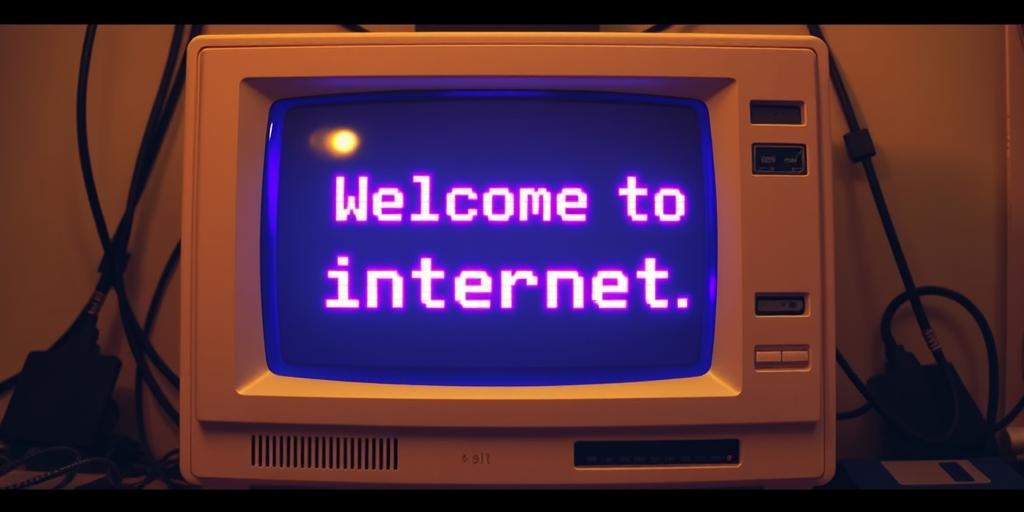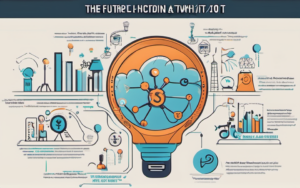The internet has become an indispensable part of our lives, connecting us globally and transforming the way we communicate, learn, work, and entertain ourselves. But it wasn’t always this ubiquitous. The journey of the internet history is a fascinating story of innovation, evolution, and the remarkable impact technology has had on our world.
The Dawn of the Digital Age
Dial-Up Connections and the Thrill of the First Email
The early days of the internet were marked by slow, dial-up connections that required a modem to connect to the digital world. Remember the iconic screeching sound of a modem connecting? It was a symbol of a nascent technology, one that felt like magic. Early internet users were primarily researchers and academics, who used it to share information and collaborate on projects. The first emails were sent in the 1970s, and they were a revelation. The ability to send messages instantly across the globe was a game-changer, laying the foundation for the modern communication landscape we know today.
The Rise of Bulletin Boards and Online Communities
Bulletin board systems (BBSs) emerged in the 1980s, providing a platform for users to connect and share information. These early online communities were often centered around specific interests, such as gaming, music, or technology. BBSs fostered a sense of belonging and connection, and they played a crucial role in shaping the social aspects of the internet. They were the precursors to the forums and online communities we see today, proving that the internet has always been about more than just information; it’s about connection and shared experiences.
The Birth of the World Wide Web and the First Web Browsers
The World Wide Web, or WWW, was invented by Tim Berners-Lee in 1989. This revolutionary technology introduced the concept of hyperlinks, allowing users to seamlessly navigate between web pages. The development of web browsers, such as Mosaic and Netscape Navigator, made the internet accessible to a wider audience. The web browser revolutionized the way information was accessed and shared, paving the way for the explosive growth of the internet in the 1990s. These early browsers were rudimentary compared to the sophisticated web browsers we use today, but they laid the groundwork for the seamless web experience we take for granted.
From Text to Multimedia: The Evolution of Web Content
The Early Days of Static Websites and HTML
The early internet was primarily text-based. Websites were static, consisting mostly of text and basic HTML formatting. The focus was on providing information and connecting people. While limited in multimedia capabilities, this era saw the development of fundamental web technologies that still underpin the internet today. HTML, the language of the web, emerged as a powerful tool for structuring content, enabling developers to create the building blocks of the modern web.
The Introduction of Images, Videos, and Interactive Elements
As internet technology advanced, the web transformed from a text-based platform to a multimedia one. The introduction of images, videos, and interactive elements greatly enhanced the user experience. The ability to display images and videos made websites more engaging and informative. Interactive elements, such as forms and Javascript, made websites more dynamic and user-friendly, opening up new possibilities for web design and development. This shift towards multimedia marked a significant evolution in the internet’s functionality and appeal, paving the way for the rich, interactive web we experience today.
The Rise of Social Media and User-Generated Content
The late 1990s and early 2000s witnessed the emergence of social media platforms like Facebook, Twitter, and YouTube. These platforms revolutionized the way people connect and share information. Social media empowered users to create and share their content, leading to a surge in user-generated content. This shift towards user-generated content democratized information and gave a voice to a wider audience, transforming the internet into a dynamic and collaborative platform. These platforms have become integral parts of our social fabric, impacting everything from news and entertainment to political discourse and social movements.
The Impact of the Internet on Society and Culture
Revolutionizing Communication and Information Access
The internet has revolutionized communication, enabling instant and global connection. Email, instant messaging, and video conferencing have transformed how we interact with friends, family, and colleagues. The internet has also democratized access to information, making vast amounts of knowledge available at our fingertips. Online libraries, databases, and search engines have made research and learning easier and more accessible than ever before. The impact of the internet on communication and information access has been profound, empowering individuals and fostering global interconnectedness.
Transforming Business and Commerce
The internet has revolutionized the way businesses operate and interact with customers. E-commerce platforms have made online shopping convenient and accessible, while social media marketing allows businesses to reach target audiences directly. The internet has also enabled new business models, such as online marketplaces, subscription services, and digital content distribution. This transformation has created new opportunities for businesses and consumers alike, shaping the global economy in unprecedented ways.
The Rise of Online Communities and Social Networks
The internet has fostered a sense of community and connection, bringing people together around shared interests and experiences. Online forums, social media groups, and gaming communities provide spaces for people to connect, share ideas, and support each other. These online communities have become important sources of information, support, and entertainment, shaping our social interactions and fostering a sense of belonging in the digital age. The internet has created a virtual world where people can connect and build relationships, transcending geographical boundaries and fostering a sense of global community.
Looking Ahead: The Future of the Internet
The Internet of Things and Connected Devices
The internet of things (IoT) is poised to revolutionize the way we interact with our environment. Connected devices, from smart homes and appliances to wearable technology and industrial sensors, are becoming increasingly interconnected. The IoT promises to automate tasks, improve efficiency, and provide new insights into our world. The internet’s expansion into the physical realm will create a more interconnected and data-driven world, with profound implications for our daily lives and the industries we rely on.
Artificial Intelligence and Machine Learning
Artificial intelligence (AI) and machine learning (ML) are transforming the internet, enabling more personalized experiences and intelligent systems. AI-powered chatbots and virtual assistants are becoming increasingly sophisticated, while machine learning algorithms are being used to personalize content recommendations, optimize search results, and automate tasks. The integration of AI and ML will continue to shape the internet, creating a more intelligent, efficient, and personalized online experience.
The Metaverse and Virtual Reality Experiences
The metaverse is emerging as a new frontier in the internet, offering immersive virtual reality (VR) experiences and creating new possibilities for communication, entertainment, and commerce. Virtual worlds, augmented reality (AR) applications, and immersive gaming experiences are blurring the lines between the physical and digital worlds. The metaverse has the potential to revolutionize how we work, socialize, and experience entertainment, creating a truly immersive and interconnected digital world.
A Journey of Innovation and Transformation
The internet history is a testament to human ingenuity and our relentless pursuit of progress. From its humble beginnings as a network for researchers to its ubiquitous presence in our daily lives, the internet has transformed the way we communicate, learn, work, and interact with the world. As technology continues to evolve, the internet will continue to innovate, creating new opportunities and challenges for society. The future of the internet promises to be even more exciting and transformative than its past, as we continue to harness the power of technology to connect, create, and explore new frontiers.




